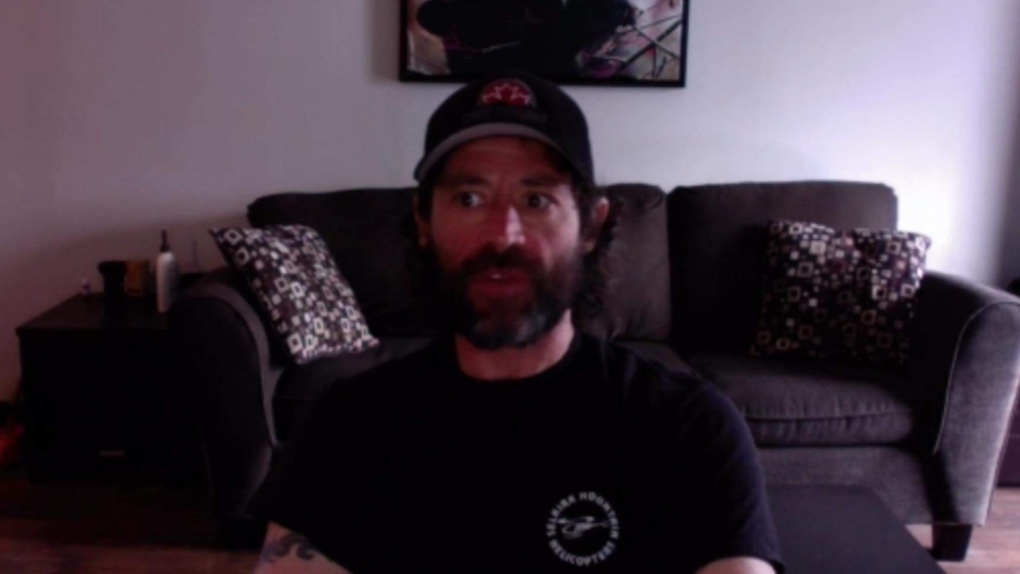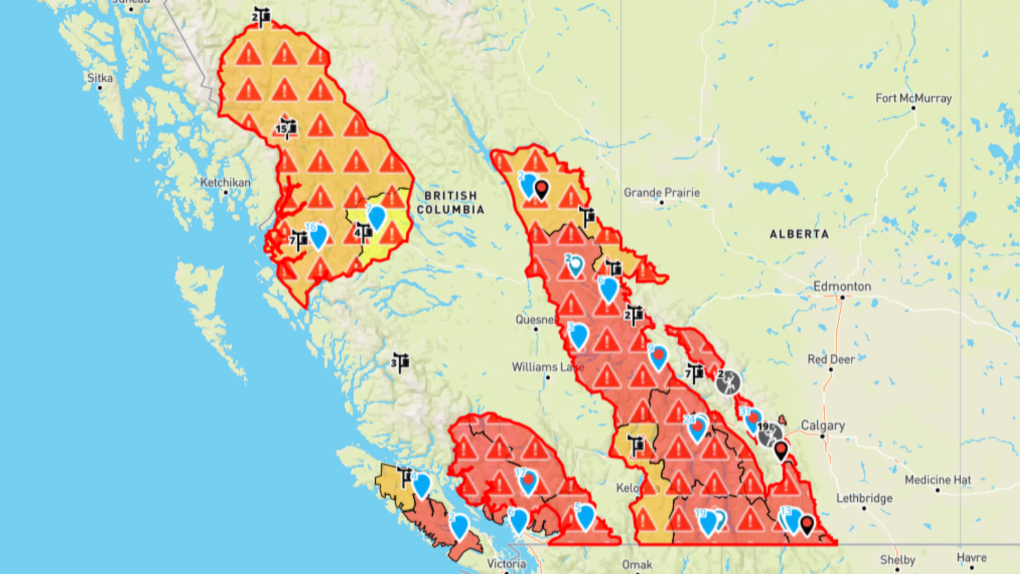'Right place at the right time': Snowmobile guide rescued man buried in avalanche near Revelstoke, B.C.
 The scene after a man was rescued from an avalanche on Boulder Mountain’s Sugar Bowl, near Revelstoke, B.C., on Feb. 27, 2024. (Courtesy: Olivier Meilleur)
The scene after a man was rescued from an avalanche on Boulder Mountain’s Sugar Bowl, near Revelstoke, B.C., on Feb. 27, 2024. (Courtesy: Olivier Meilleur)
Quick thinking from a snowmobile tour guide helped save a man buried in an avalanche near Revelstoke, B.C., earlier this week.
Olivier Meilleur, a guide and avalanche forecaster with Great Canadian Tours, knew it was going to be a high-risk avalanche day on Tuesday based on the forecast.
He was heading out with a group on a tour of Boulder Mountain’s Sugar Bowl and opted to stick to more conservative routes.
On their way back, Meilleur and his group came across the site of a level three avalanche.
“I just saw some random people probing at that point and was not too sure what was going on at that scene,” Meilleur said.
After talking with the group, he learned a man had been buried in the avalanche for about 10 minutes.
“I started taking charge of the scene and I just took my transceiver out, started doing a cell signal search, which I found pretty quick,” he said.
 (Courtesy: Olivier Meilleur)
(Courtesy: Olivier Meilleur)
Meilleur followed the signal and, along with the other members of the lost person’s group, started probing and digging.
“(When) we got to the subject he was buried right side up, so we arrived at the head, the first thing, which was nice,” Meilleur said.
He checked the man’s mouth for snow blockages and noticed that he was unconscious, had started going blue on the nose and lips and his face was a greyish colour.
“At this point, I knew he was not breathing,” Meilleur.
They pulled the man out and Meilleur went to retrieve his first aid kit. But when he returned, he saw that the colour started to return to the man’s face, he was breathing and had a weak pulse.
After about two minutes, the man was able to respond to questions by blinking his eyes, and after five minutes, he could talk again.
The group worked to warm the man back up, using boiling water in bottles from a small stove. A search and rescue crew arrived a short time later and got the man into a helicopter for medical care.
Meilleur talked with the man the next night and learned that he was feeling good and escaped the incident without being injured.
“I was just at the right place at the right time,” he said. “I'm a trained professional. I've been doing that for a long time. I've been practicing my skill, like every winter, every month.”
 Olivier Meilleur spoke with CTV News via video call on March 1, 2024. (CTV News)
Olivier Meilleur spoke with CTV News via video call on March 1, 2024. (CTV News)
Meilleur encouraged anyone visiting backcountry areas to practise using their safety equipment frequently and use caution.
“I want people to make some good decision-making out there because that could have been prevented as well, like it was a high avalanche (risk) day,” he said.
“When you go up in the backcountry, you should be aware of the danger you put yourself in and be prepared if something happens.”
Tyson Rettie, an avalanche forecaster with Avalanche Canada, said anyone heading into the backcountry should take an avalanche skills training course beforehand.
“You’ll learn how to identify avalanche terrain, you'll learn how to read the forecast, understand all the material that's there,” Rettie said.
“It's also important that you have the essential companion rescue gear before you're heading out into the mountains. So that's your probe shovel transceiver, and on that avalanche skills training course you'll learn how to use that equipment.”
Avalanche risk continues
Avalanche Canada issued a special public avalanche warning for areas in Alberta and B.C., effective Feb. 29 through to March 4.
Rettie warned that backcountry visitors should avoid avalanche terrain in these at-risk areas. He encouraged people to avoid terrain steeper than 25 degrees.
“So that doesn't necessarily mean you can't go into the backcountry but means when you're out there, you really need to be aware of your surroundings, the terrain you're in and stay out of avalanche terrain,” Rettie said.
The avalanche warning extends throughout the Rockies, ranging from dangerous to very dangerous conditions.
 Avalanche warnings in Alberta and B.C. as of 1 p.m. on March 1, 2024. (Source: Avalanche Canada)
Avalanche warnings in Alberta and B.C. as of 1 p.m. on March 1, 2024. (Source: Avalanche Canada)
“Recent storms have deposited a significant amount of snow across Western Canada,” Avalanche Canada said in the warning.
“This new snow sits on prominent weak layers established during drought conditions in February. In some areas, there is more than one weak layer.”
While the storms are expected to pass, human-triggered avalanches remain likely, due to weak layers in the snowpack.
Avalanche Canada warned that people enjoying the backcountry recreationally “should not underestimate the instability of these weak layers or their potential to produce large avalanches.”
“Although the new snow is appealing, making conservative terrain choices will be an important strategy for all backcountry users over the next few days,” the non-profit organization said.
“A good way to do this is by sticking to lower angle slopes, avoiding overhead hazard, and choosing smaller objectives that minimize the consequences of an avalanche.”
The avalanche risk is expected to trend down slightly throughout the weekend, according to Rettie.
The warnings come after a person was killed in an avalanche near the Alberta-B.C. border last weekend. The size three avalanche that occurred on Saturday at Castle Wildland Provincial Park, was triggered by a group of snowmobilers.
Visit Avalanche Canada’s website for up-to-date avalanche warning information.
With files from CTV News Vancouver's Andrew Weichel
CTVNews.ca Top Stories

Trudeau cabinet to meet Friday as speculation around a shuffle swirls
Prime Minister Justin Trudeau's cabinet is expected to meet on Friday, CTV News has learned. The agenda sets aside 30 minutes for ministers to meet virtually Friday morning, to talk about 'appointments.' The meeting comes amid speculation around the prime minister shaking up his inner circle.
Poilievre vows to fire envoy as Canada buys a $9M condo for diplomat in NYC
Conservative Leader Pierre Poilievre is promising to fire Canada’s consul general in New York City if the Tories wins the next federal election.
'I feel like he did not die in vain': Family responds to report on tortured B.C. boy's death
The heartbreak over the death of an Indigenous 11-year-old Fraser Valley boy, tortured and then ultimately killed by his foster parents, was felt by all who knew him.
Rare photos reveal uncontacted tribe in Peruvian Amazon as loggers move in
Rare images of the Mashco Piro, an uncontacted Indigenous tribe in the remote Peruvian Amazon, were published on Tuesday by Survival International,
Here's who will take the podium today at the Republican National Convention
This year's Republican National Convention continued Wednesday with a packed list of speakers including vice presidential candidate Sen. JD Vance, Donald Trump Jr. and Texas Gov. Greg Abbott.
In ethics hearing about Liberal minister, business exec admits he lied to a reporter
The chief witness in a parliamentary probe said Wednesday that he lied to a reporter when asked about ethics allegations against a federal minister.
'Tragic trend' of fatal crashes prompts plea from B.C. Highway Patrol
Mounties who patrol B.C.'s highways are urging drivers in the province to slow down amid a 'tragic trend' of recent, fatal crashes.
Trump shooter requested Saturday off from work and told colleagues he'd be back at work Sunday, officials say
The shooter who attempted to assassinate former U.S. president Donald Trump on Saturday normally would have been at work that day, but he told his boss he needed that the day off because he had 'something to do,' according to multiple law enforcement officials.
U.S. eases new border rules for dogs from Canada as Liberals try to secure exemption
Health Minister Mark Holland says he's trying to convince U.S. authorities that Canadian dogs should be allowed to cross the border without restrictions.

































